There is no doubt that visiting a cenote along the Ruta de Los Cenotes is one of the most popular things to do when visiting Mexico. These fresh water sinkholes are the perfect way to cool off after exploring the Mayan ruins or simply on a hot day.
Visiting the Ruta de Los Cenotes
During previous trips, we’d explored cenotes closer to Playa del Carmen. On this adventure, we steered our rental car in the direction of Puerto Morelos just south of Cancun. Puerto Morelos is the starting point for the Cenotes Trail that stretches across the entire Yucatan Peninsula.
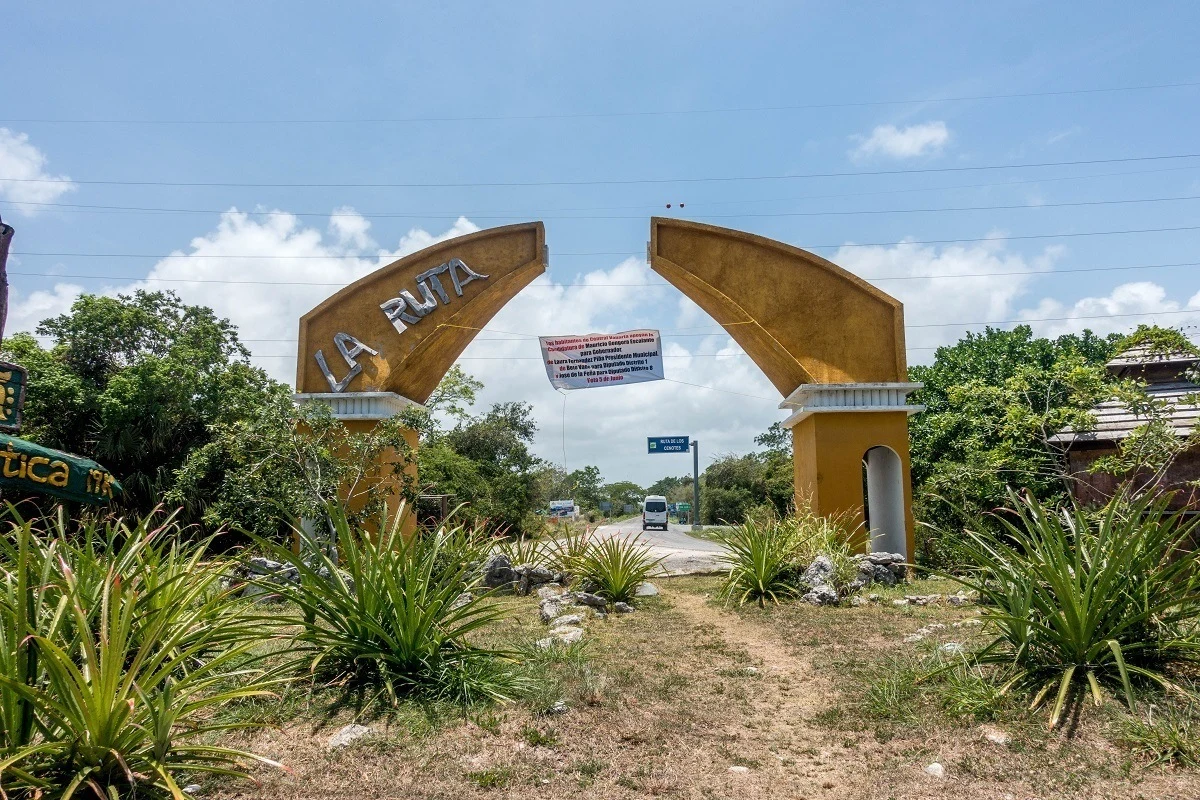
On the south end of town, a two-lane highway leads under a concrete welcome archway that proclaims the “Ruta de Los Cenotes.” The painting on the welcome archway was well worn and faded, which should have been a sign of things to come. However, we figured this was a well-worn tourist trail and off we went. [NOTE: For the last few years, the archway has been removed and the entrance to the route appears to be under construction. Perhaps a new sign is coming. The Route is open for business.]
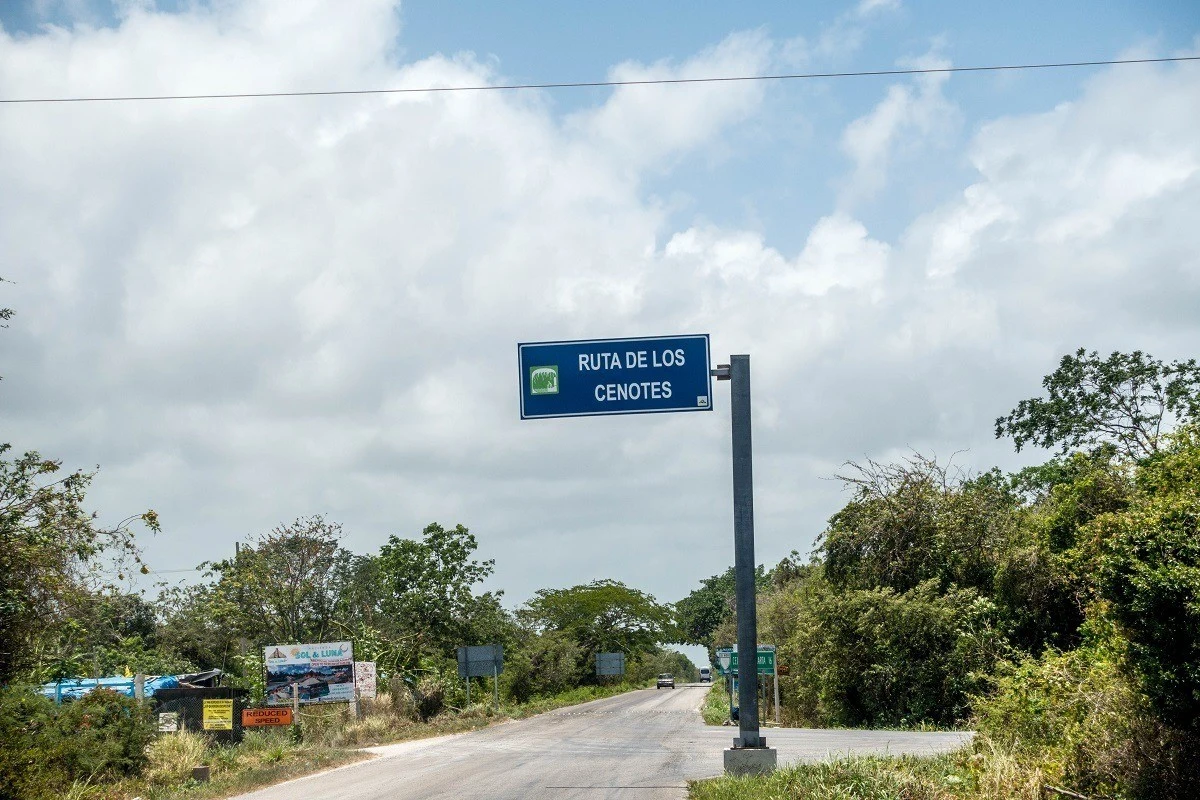
Driving along the road we passed a number of small inns and haciendas – all closed and in terrible states of disrepair. It was soon clear to us that the heyday of the Ruta de Los Cenotes in Mexico was long over. However, we soldiered on, driving west in search of these swimming holes.
Our goal was to visit at least one open cenote and one closed one. Closed cenotes are essentially caves full of fresh water with a small access hole in the roof or on one side. Open cenotes have had their roofs cave in, so they are essentially small fresh water lakes.
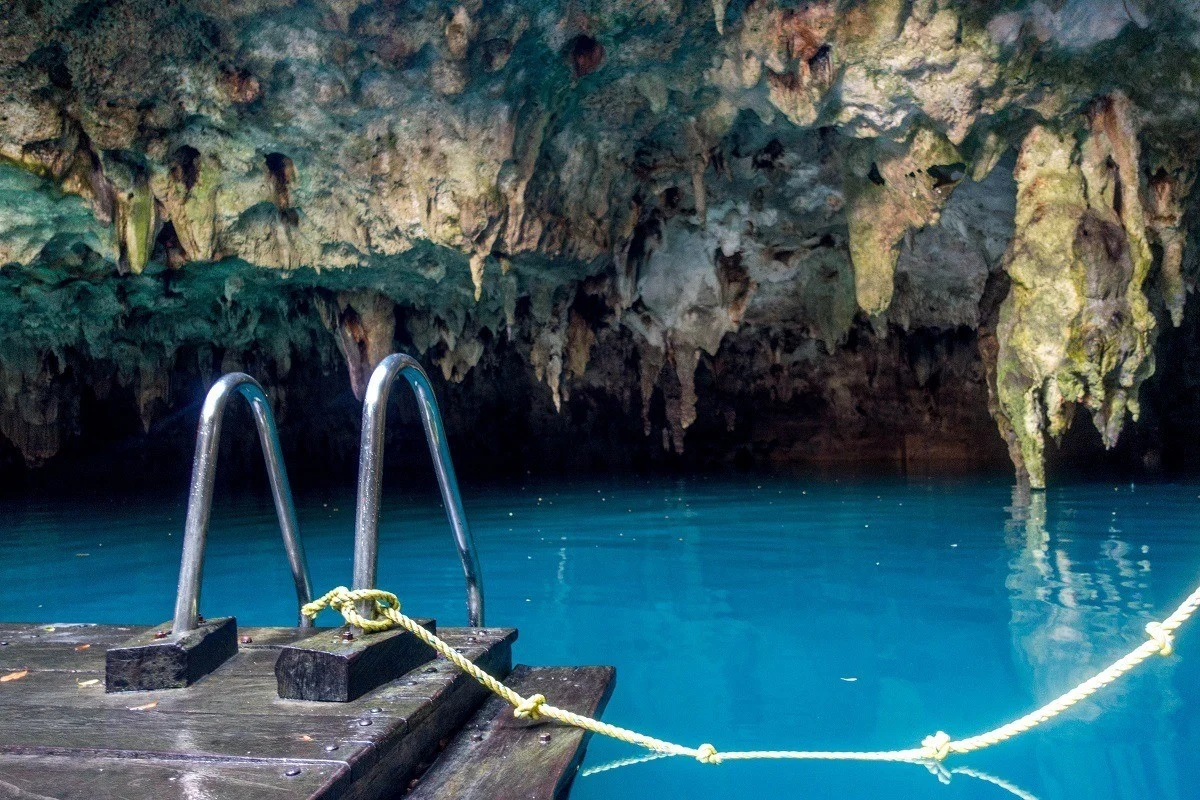
Laura had previously visited this area as part of a cenotes tour. As we drove on, we had the realization that some cenotes tours take visitors to private cenotes, not accessible to folks like us on a do-it-yourself, independent cenote tour.
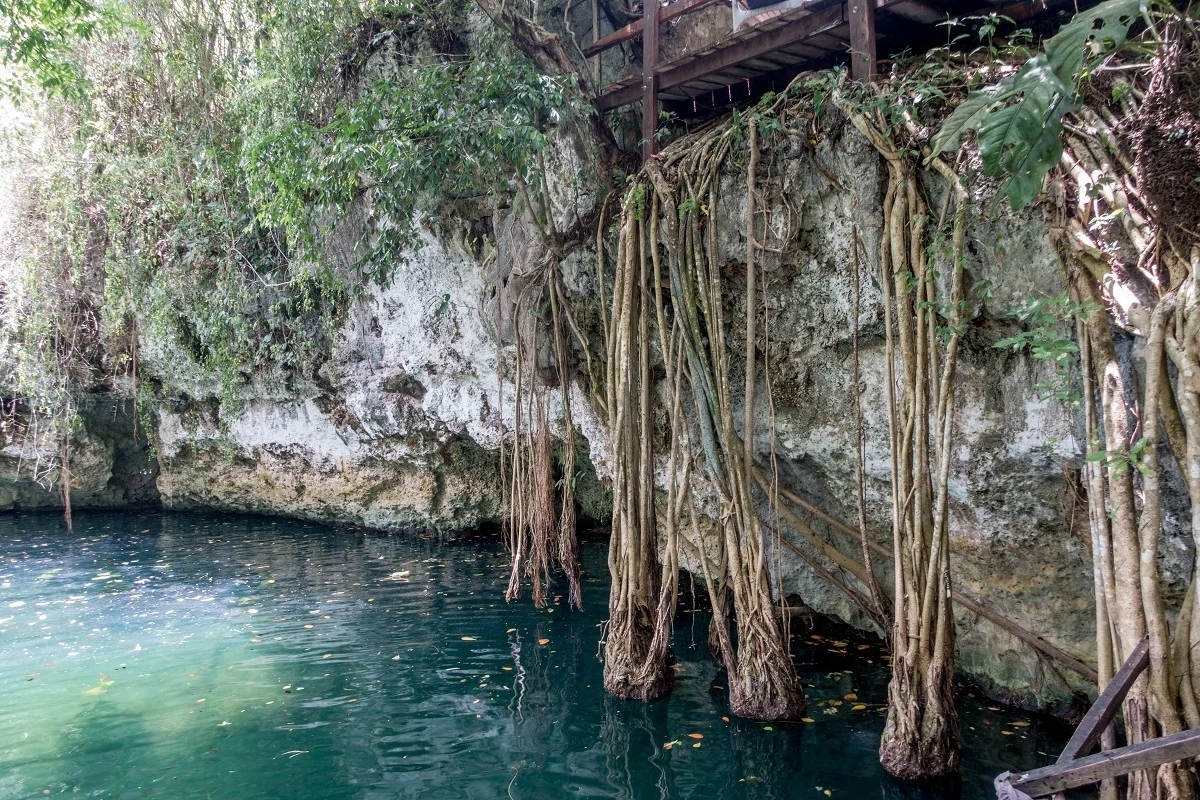
Our first stop of the day was at Cenote Verde Lucero. We paid our admission, parked the car, and headed to the platform area. I immediately headed down the stairs to get a feel for the water. It was cool, but felt good on a hot day. I walked out on the rope and balanced myself as I watched one of the local kids take to the zip line and drop effortlessly into the water. He was a pro. I thought: “I got this.”
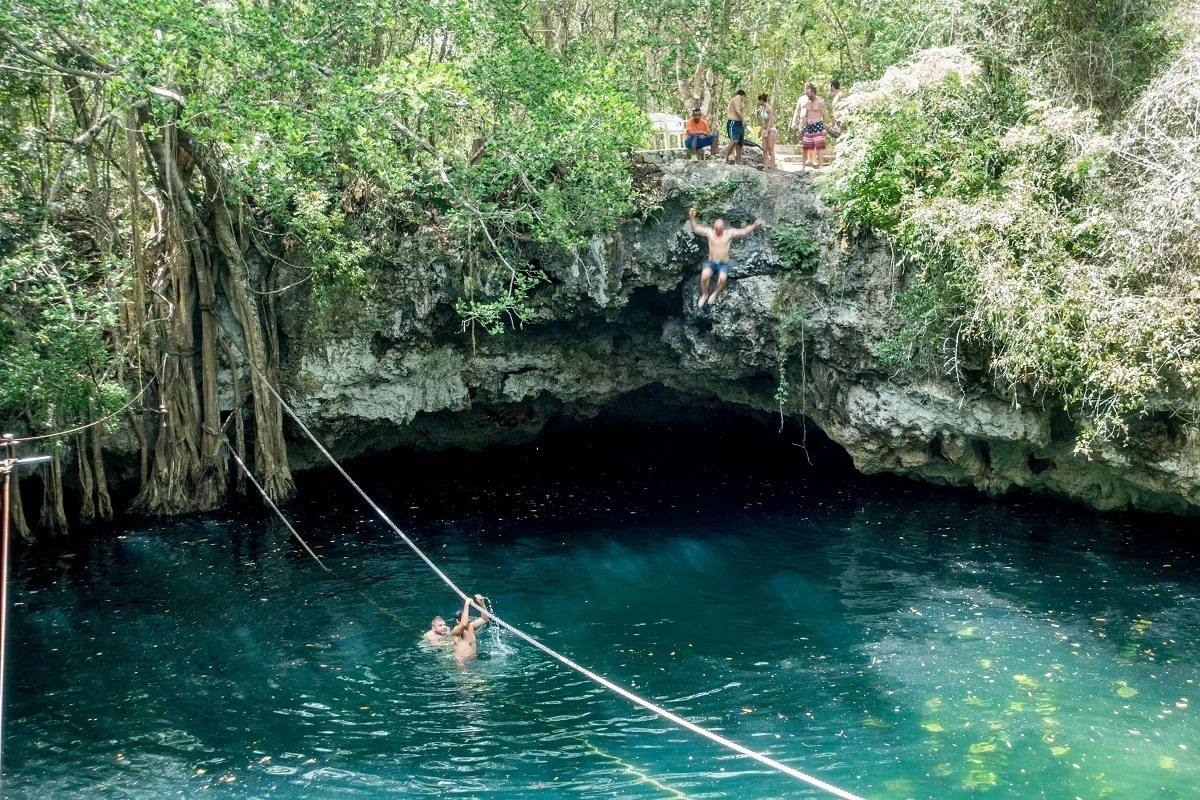
I climbed the ladder and walked over to the zip line. The zip line was nothing more than a sturdy handle bar that ran down a steel cable across the water. There was a trailing rope that set a maximum distance (and allowed for the handle bar to be pulled back). If you were still hanging on, the rope would stop the handle and you’d fall. Seems simple enough.
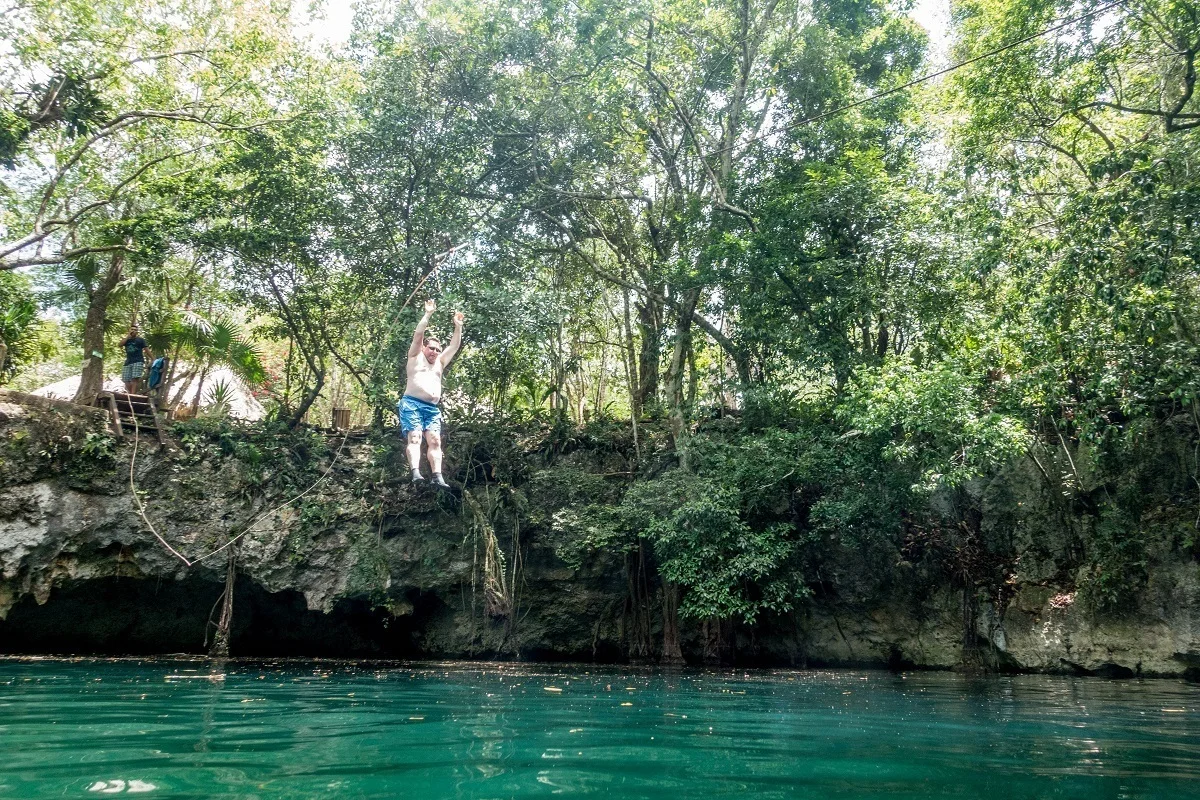
I grabbed the bar and off I went. I could hear yelling in Spanish. There was snap and I hit the water. My first sensation was the searing pain in my right arm. The wristband for our resort was gone (I realized that was going to cost me another $25), but my entire arm had a rope burn on it. As one of the guys was yelling, “You OK amigo?” I nodded. God, my arm hurt like hell. Thankfully, the water was very cooling.
It took me a minute to fully work out what happened. Evidently, when I grabbed the zip line handle, I got the trailing rope in front of my hands. When I reached the end of the line, the rope snapped back…along with my entire arm. I was lucky the injury wasn’t worse. After a two-minute pause to catch my breath, I went up and did the zip line again. This time with the rope behind my hands and dropping into the water before I reached the end of the line.
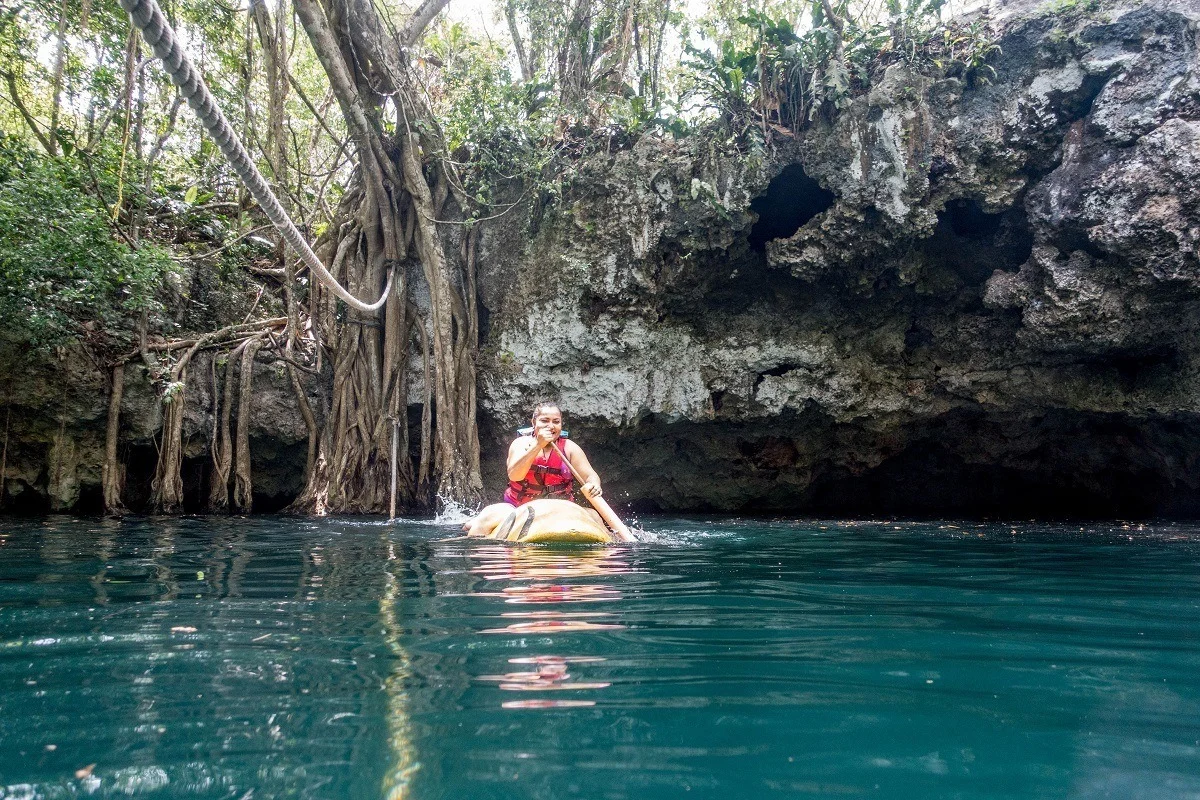
Despite the near injury, we loved Cenote Verde Lucero. We loved that we had the place practically to ourselves even more. After an hour, we jumped back into the car and headed down the road.
We were deep in conversation about my stupid mistake and missed the dirt road at kilometer 19, which meant we drove all the way to end of the road in the town of Leona Vicario – about a 45-minute goose chase. We didn’t see any others. We couldn’t figure out how there weren’t any others on the route. We backtracked and realized our mistake.
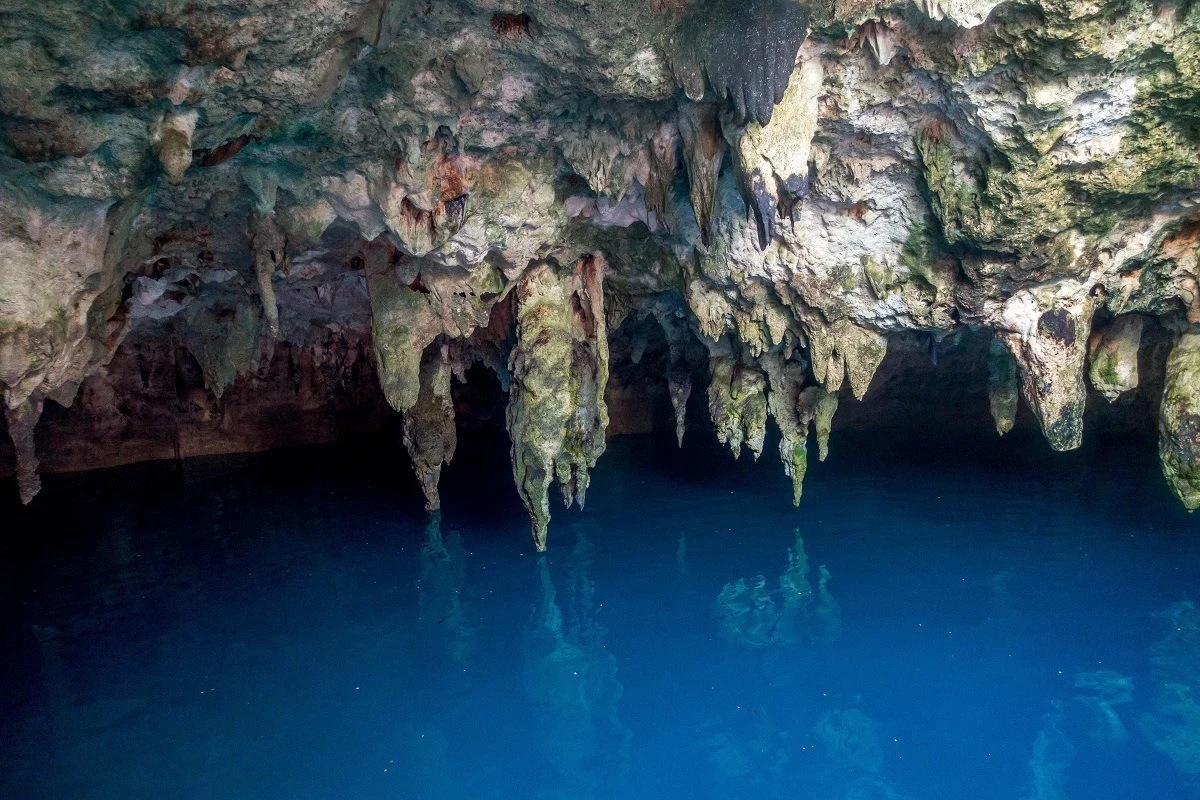
Many of the swimming holes on the Ruta de Los Cenotes are off the main road. Some are on private lands and not accessible to visitors, but some are on dirt access roads. Taking the dirt road at kilometer 19 to the south, after a few kilometers we came on the sign for Cenote La Noria. The side road to La Noria is pretty bad. If you’re in 4×4 or on an ATV, you’ll do fine. We had a nice little rental car and needed to take it slow.
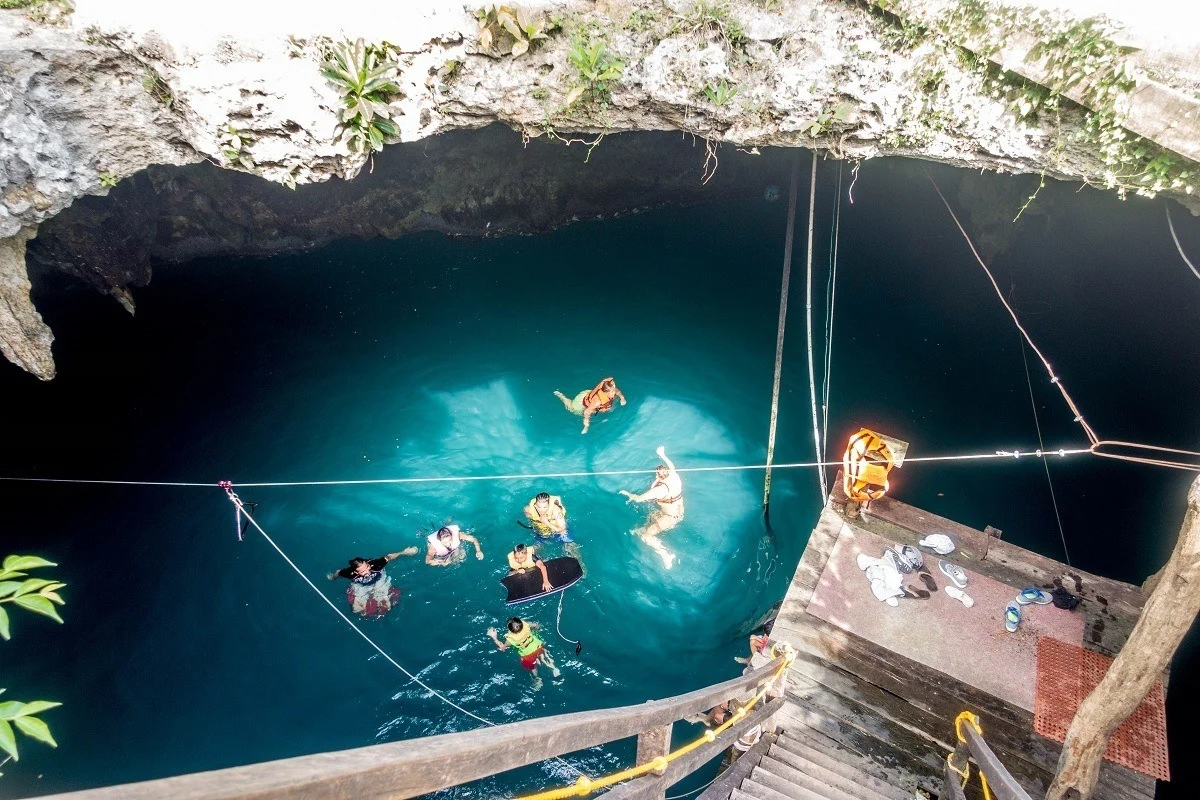
At Cenote La Noria, there were a couple of other Mexican families, but we were the only gringos to be seen. Closed cenotes like La Noria are much, much colder than the open ones since sunlight can’t reach the water to warm it.
La Noria was positively frigid, but it felt great on my arm (like nature’s ice pack). It took a long time to get used to the cold water, but our bodies did adjust. I enjoyed seeing a closed cenote to contrast with the open one.
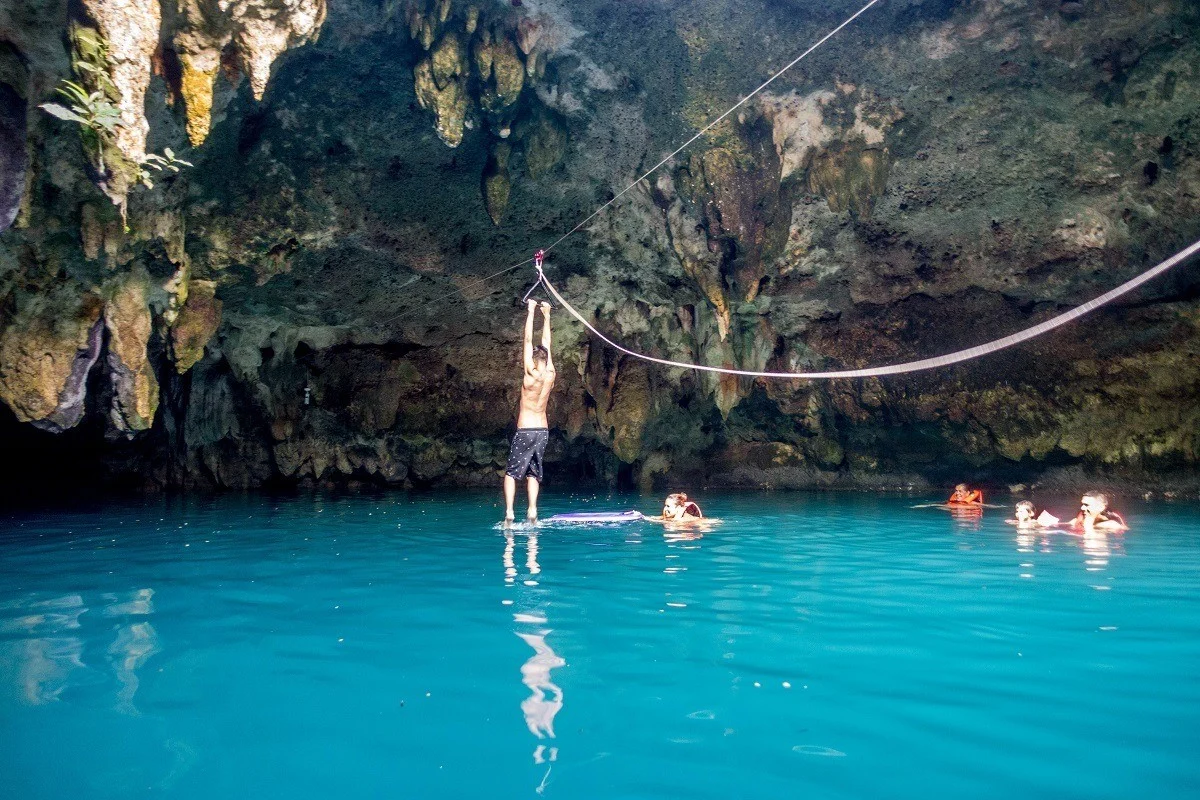
At the end of the day, we had ourselves an authentic adventure. The cenotes along the route aren’t like the fancy ones further south. You won’t find broad, paved parking lots. There are no concession stands. The facilities on the Rute de Los Cenotes look well past their prime. But it’s a great way to get away from the crowds of Cancun or Playa del Carmen and cool off.
Cenote Las Mojarras
Located at about km 12. This is a large open cenote with a double zip line and a double tower to jump into the water. There are bathrooms, hammocks, a picnic area and a camping area.
Cenote Verde Lucero
Located just past km 17 on the left side of the road. It is approximately 200 yards off the road. This is an open cenote a short walk from the parking area. There is a single zip line and a swimming platform in the water. There is also a rope across the water to walk across with a guide rope above. The Cenote Verde Lucero is generally open from 9am-5pm.
Cenote La Noria
Drive to km 19 and take the dirt road on the left. The entrance to Cenote La Noria is another ~3 kilometers down this road. This one is well marked by a small white sign on the right. Then take the really rough dirt road another 1500 meters (just shy of one mile, but it feels a lot longer than that). This is a closed cenote that has two entrances on either side of the parking lot. There is a large floating platform in the center and a short zip line located inside the hole.
Cenote Kin Ha
Drive to km 19 and take the dirt road on the left. Drive ~5 kilometers (you will pass La Noria). There are large signs – you can’t miss it.
Cenote Zapote
Drive to km 19 and take the dirt road on the left. Drive ~5 kilometers (you will pass La Noria). There are large signs – you can’t miss it.
Cenote Visitor Tips
Pack your own lunch and snacks since there really aren’t facilities at these places. All sunscreen and insect repellent must be biodegradable! You will also want to bring your own towel and waterproof camera.
Cenote Tours
If you are without a rental car or want to do this as a guided cenote tour, there are many options.
Hotel and Accommodations
There are many hotel and other accommodation options on the Riviera Maya. Check out some of the Riviera Maya hotel options. We’ve also had good luck with accommodations by renting an apartment in Playa del Carmen.
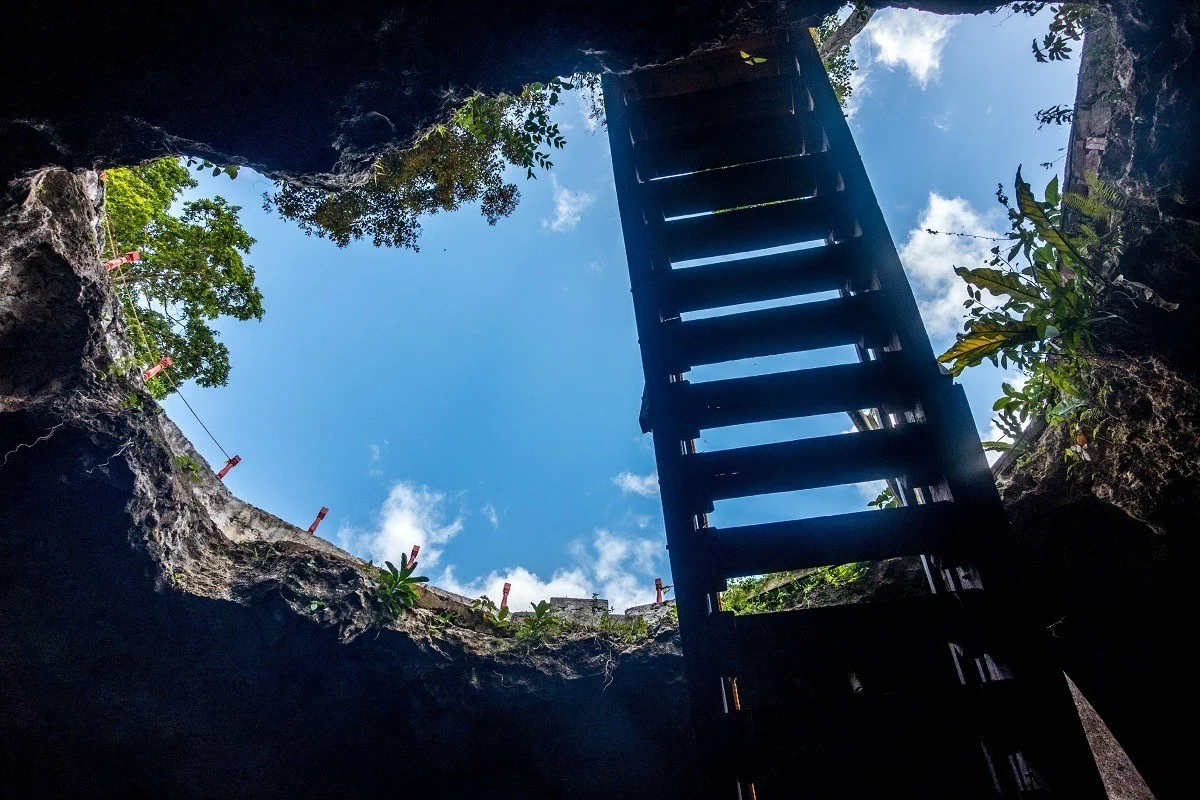
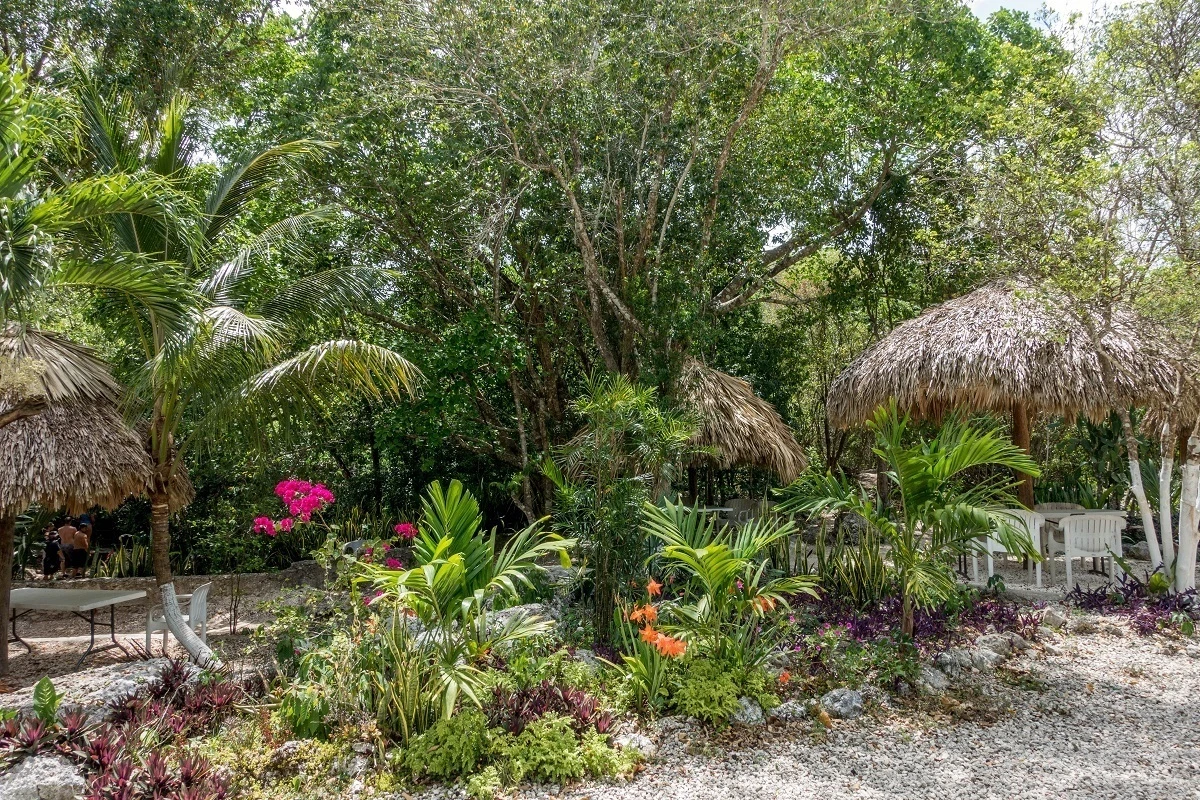
Lance Longwell is a travel writer and photographer who has published Travel Addicts since 2008, making it one of the oldest travel blogs. He is a life-long traveler, having visited all 50 of the United States by the time he graduated high school. Lance has continued his adventures by visiting 70 countries on 5 continents – all in search of the world’s perfect sausage. He’s a passionate foodie and enjoys hot springs and cultural oddities. When he’s not traveling (or writing about travel), you’ll find him photographing his hometown of Philadelphia.

Don
Wednesday 8th of February 2017
That one of the best reviews I have ever read.period. It is accurate and precise. Thank you! Keep up the good work. Re.... swimming with the turtles in akumal